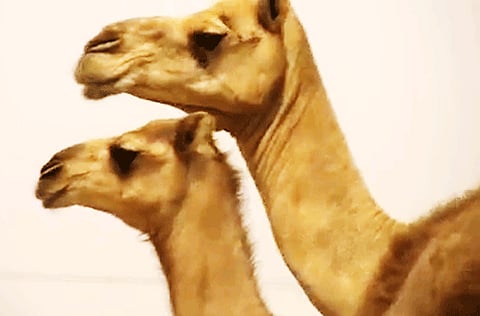Future of camel breeding
A look into how a Dubai-based farm is using a scientific technique

Dubai: Deep in the Dubai desert, some 25km from the centre of the city, veterinarians are working on a first-time project that could have historic implications for future camel breeds.
In the 150 hectare desert farm, 14 calves stand out among the 2,500 camels living there because they are the product of a new procedure through which farmers hope camel milk could become available to a wider pool of people in a shorter period of time.
Camel milk: The Emirates Industry for Camel Milk and Products (EICMP), is the world's first and only camel farm to specialise in milk production in large scale.
Videography: Sunita Menon, Reporting: Abbas Al Lawati
The Emirates Industries for Camel Milk and Products (EICMP) is a private project that was initiated and is supported by the Dubai Government.
The facility includes a farm and a milk processing plant that produces 4,500 litres of camel milk per day for the shelves of the UAE's supermarkets and to be shipped abroad.
The facility was set up to promote camel milk and camel milk products, and has been sold at reduced rates to encourage residents to adopt it.
EICMP is the world's first and only camel farm to specialise in milk production at that scale. The farm and veterinary sections are run by Dr Judit Juhasz, the chief veterinarian, and Dr Peter Nagy, the farm manager, who have over a decade of experience in camel breeding and embryo transfers.
Passionate about their jobs, both veterinarians have several favourite camels which they have named. Despite the large number of camels on the farm, they insist that they can recognise their favourites. The rest of the camels are known to them by numbers.
"You just learn to distinguish between the camels with time," shrugs Dr Juhasz as she feeds carrot snacks to the camels.
Turning the ancient practice of camel milk drinking into a consumer product, however, is not without hurdles. In markets where cow milk dominates, it is a challenge to have the product compete and remain feasible as a business.
While cows can produce up to 40 litres of milk a day and about one calf a year on average, camels produce seven litres of milk a day and one calf every two-and-a-half years in a 13-month pregnancy.
EICMP works around that through a selective breeding procedure that involves making one milk-producing mother have multiple offspring through surrogate mothers, which it developed with the cooperation of Dubai's Camel Reproduction Centre.
The process
The process involves having the high-milk-producing female camel produce more eggs, or ova, by being injected with a female hormone. The female is then mated with a selected male, or bull, and once the female's eggs are fertilised, they are removed from its uterus through a non-surgical "flushing" technique.
The veterinarians then identify the embryos under a microscope, clean them and manually inject each directly into a surrogate mother's uterus using a catheter. Six in 10 of such cases result in pregnancy.
"With flushing, we get out all the embryos. If we take 10 embryos we transfer them into 10 surrogate mothers," says Dr Juhasz.
The procedure ensures that one high producing mother can have up to 10 offspring instead of one, thus speeding up the breeding process and making the farm more efficient.
While selective breeding through embryo transfers in animals such as cows and even camels is not a new phenomenon, it has never been done in camels to improve their milk production.
It has not been proven yet whether, like other animals, high milk producing camels' offspring will produce similar amounts of milk. The veterinarians are hopeful, but will have to wait for the young calves to grow to determine their production levels.
For the past 20 years, camels have been selectively bred in the UAE for the purpose of racing. As with horses, well performing camels had been selectively bred to produce subsequent generations of racing camels. EICMP's innovation is, however, in that it selectively breeds camels to produce new generations of better milk producers. "We have camels from different regions of the world, and their milk production average is the same. This means that camels have never been selectively bred for milk production," said Dr Peter Nagy, the farm manager.
Through selective breeding, the veterinarians hope to improve milk production every generation. The 14 special calves are those that were born as a result of the procedure. Another 50 surrogate camels are currently pregnant.
Break-even point
"[The venture] is reaching its break-even point," said Dr Nagy.
The work being done at the farm has caught the attention of the outside world as word has spread about the nutritious value of camel milk.
Dr Nagy says it regularly serves as a stop for European diplomats touring the country.
The future potential for camel milk and products is huge, he says. While chocolate made of camel milk has already hit the shelves, there are plans for cappuccino and a possible future expansion into cheese, ice cream and milk powder and cosmetic products.
Importantly, he points out, it has also attempted to bring back to Emiratis a camel-milk drinking practice that was almost lost as society was urbanised.
"By introducing camel milk in schools, perhaps we can get the next generation of Emiratis to start drinking camel milk again," says Dr Nagy.
Sign up for the Daily Briefing
Get the latest news and updates straight to your inbox


